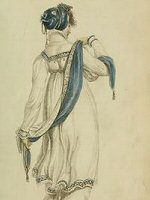Lavinia Lovelace
 |
|
| Portrayed by placeholder | |
| Full Name | Lavinia Helen Lovelace |
|---|---|
| Associated Noble House(s) | Earldom of Foxleigh (1) |
| Date of Birth | 23rd February 1794 |
| Father | Barnaby Lovelace |
| Father's Rank | Earl of Foxleigh |
| Mother | Celia Lovelace |
| Mother's Rank | Countess of Foxleigh |
| Town Residence | |
| Year of Debut | 1811 |
| Dowry | |
Lavinia Lovelace is a former character created by Cait
Family
- Father – The 6th Earl of Foxleigh, Barnaby Andrew Lovelace. Born 1750. Aged 61.
- Mother – Countess of Foxleigh, Celia Helen Lovelace, nee Aston. Born 1767. Aged 44.
- Eldest brother – Viscount Lovelace, Ferdinand Barnaby Lovelace. Born 1786. Aged 25.
- Elder brother – The Honourable Paris Lovelace Born 1788. Aged 23.
- Elder sister –Lady Hermione Celia Lovelace. Born 1790. Died 1808, Aged 18.
Background
BACKGROUND The Lovelace parents were raised from very different backgrounds. Her father was born into nobility, possessing a cold father with little interest in his heir, and a mother he never met after she was institutionalised shortly after his birth. Her mother instead came from an unorthodox artistic family, and though their differences were a primary factor in bringing Barnaby and Celia together, their vastly difference childhoods resulted in two almost incompatible parenting styles which occasionally caused conflict, or confusion, in their otherwise loving home. As the youngest of the Lovelace children, Lavinia was somewhat spoilt by her older siblings. Named for the tragic heroine of one of Shakespeare’s earlier, more violent plays ‘Titus Andronicus’, she grew up to be a happy cherub of a child, despite the unhappy story of the character she was named for. Untouched by sadness or illness, she earned the adoration of every member of her household – particularly her father. After his own depressing childhood, Barnaby had struggled with the role of father however with the bundle of sunshine that was little Vinia he became unusually demonstrative of his affection and she has always been his favourite child.
Their mother allowed her children rather a lot of freedom, especially her daughters, and was loathed to educate them more then seemed necessary in her own some what ignorant eyes. Lavinia therefore had a rather eclectic education, featuring whatever she managed to learn from her brothers – whose education was more strictly watched by their father – and a great deal of focus on literature with her mother. When all four of the Lovelace children were together, and free from their studies, the youngest child was apt to become their leader and decide upon their activities and therefore all four children spent much of their time robed in fabric filched from the loft, enacting Shakespearian plays, epic poems, and tales from History.
As she grew older, her education became more settled after her father’s decision to hire his two daughters a governess when Lavinia was eleven, after hearing how poor her knowledge was in a wide variety of areas. This schooling occupied much of her teenage years, as she was educated to a reasonable standard and taught the other necessary skills a gentle lady requires.
Always close to her siblings, Lavinia had been hugely jealous when at 17 her older sister Hermione was introduced to society, while she had no choice but to stay home and would try on her sister’s dresses and pin up her hair in secret. The envy was eclipsed by excitement, and the younger girl would hang upon her sister’s arm and beg for details, shriek with joy at any compliments Hermione shyly repeated and do everything she could – however little it may be – to assist her sister’s transformation into a beautiful young woman of society.
This was somewhat cut short by her sister’s death at 18, while Lavinia was just 14. The older girl had always been somewhat more frail then her younger sister, and would regularly spend the winter bedridden with illness brought on by the cold weather, waited upon by her siblings and parents. The diaphanous fashion did nothing to help Hermione’s health, and she became gravely ill with pneumonia in the winter of 1808, eventually succumbing to the disease in early December. Lavinia refused to believe the news at first, and locked herself in her room for two days refusing to see anyone, before allowing her family to assist her through her first experience of grief.
The tragedy only brought the Lovelace family closer, however the tragedy means that Lavinia views her own upcoming début into society as tinged with melancholy, without her sister’s presence beside her.